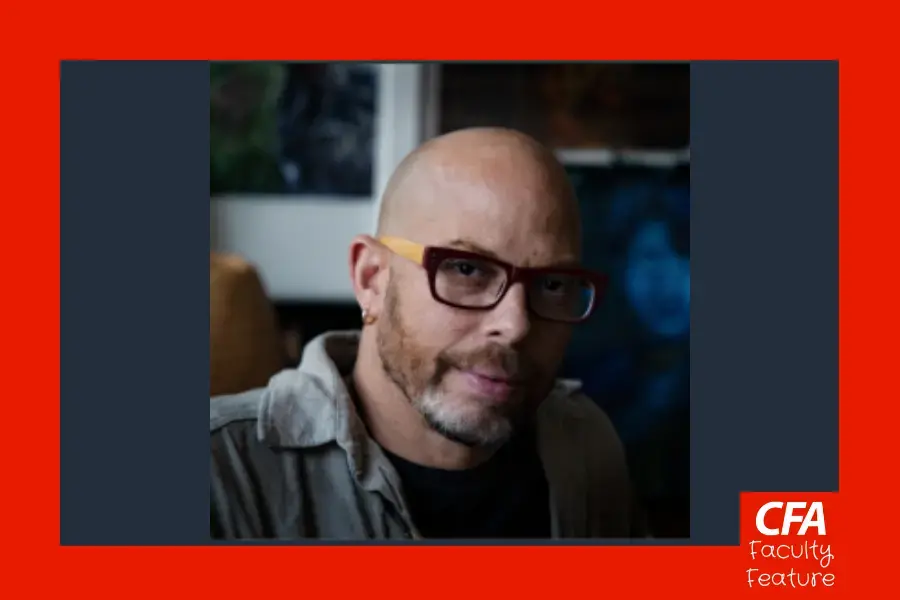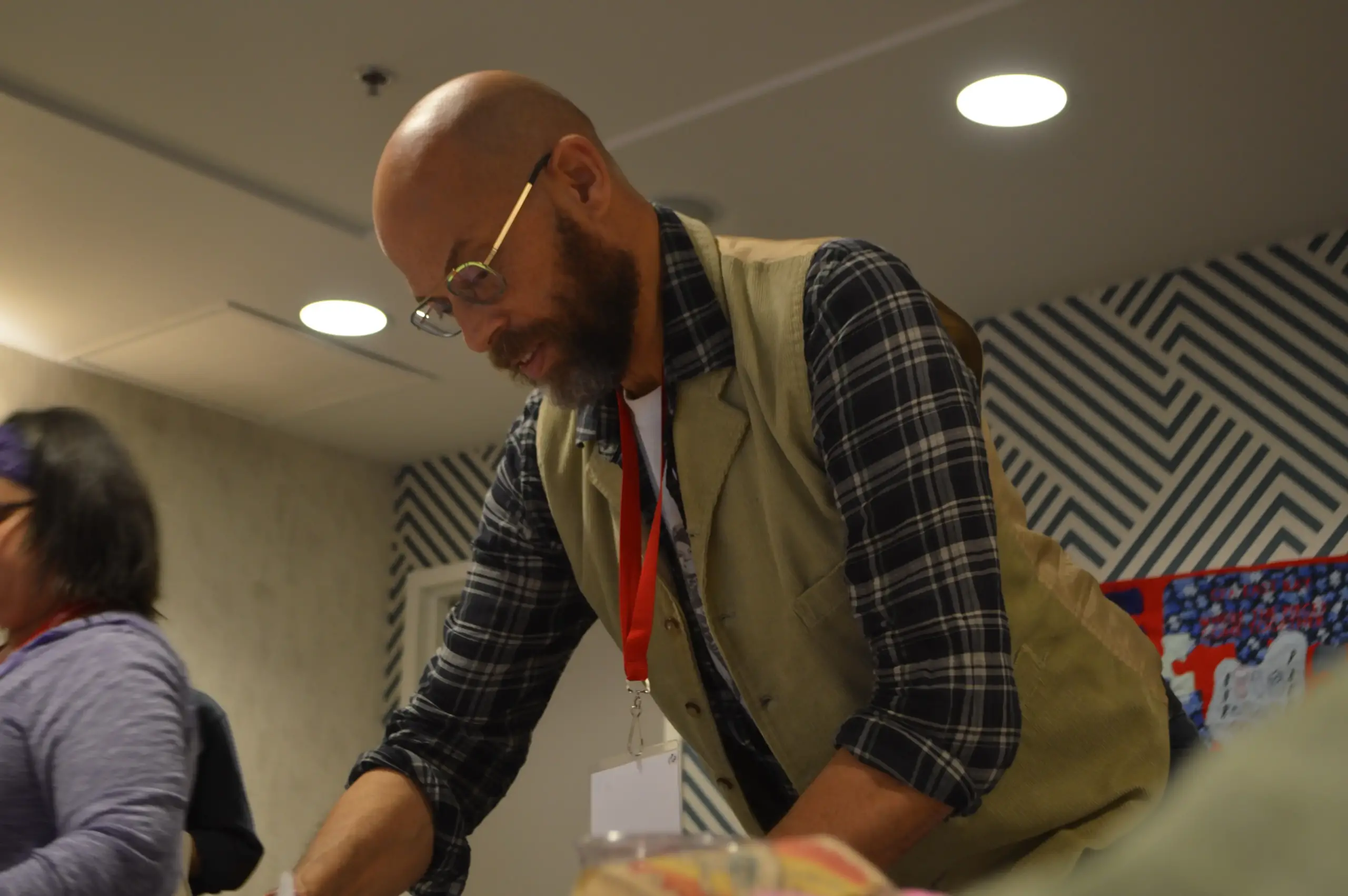CFA San Francisco Member Brings Black Art and Activism to Students
“As an educator, I want people to have a sense of empowerment. I want them to have ownership of their own creative experience. It’s a very humane thing knowing we are inherently creative.”

CFA member Mark Allan Davis’s “artivism” is found in writing, directing, curricular innovation, pedagogy, and research about the history of the Black arts and power movements. It has taken him from performing as an original cast member of the Broadway musical “The Lion King” to landing at San Francisco State University’s Department of Africana Studies. Inspired in his youth by a family embracing politics, law, the arts, music, and community, Davis has traveled the world spreading the power of art and social transformation, and the long history of the Black body and human expression.
“As an artist and scholar, I’m devoted to the study and creation of performance, and the relevant histories of the diaspora and the endurance and resilience of Black people’s ability persist in the long journey of self-expression and definition,” said Davis, CFA San Francisco Council for Racial & Social Justice representative and Africana Studies department representative, who also serves on CFA’s Contract Development and Bargaining Strategy Committee.
“The activism with CFA – the people in my union, they are my tribe. I wouldn’t have made it this far within the CSU if it wasn’t for CFA.”
– Mark Allan Davis
Davis was born in the 1960s and claims his heritage as the progeny of the Black Arts Movement and the bountiful artistic milestones that came from that generation’s uplifting renaissance. The artforms came organically through his family’s traditions, as well. “My family played lots of music, lots of jazz, R&B, and, of course, Motown. It’s just what we did,” Davis said, remembering awestruck visits to Alvin Ailey American Dance Theater, watching searing Black musicals like “Purlie” and “Don’t Bother Me, I Can’t Cope,” and at, 10 years old, seeing The Jackson 5 live in concert.
Davis entered academia as a visiting artist at Smith College where he discovered that higher education was a solid destination where one can continue to develop and hone one’s craft while also inspiring a new generation of young leaders, whether artists or biochemists.
“I teach students to have creative ownership of their education,” he said. “I want to create an environment where students can have an experience in actively learning, be it through theater history or the history of politics with race and social justice. Theater is political, especially Black creativity.

“I want to create consciousness, let students know about their histories and that they possess many gifts, potential, and talent that they’re not yet accessing: their creativity, their expression. I want to help recalibrate what people think about what they aren’t: ‘I’m not creative’ or ‘I’m not artistic.’ I want them to undertake the sojourn and help them become cognizant of their untapped potential, to be courageous in articulating who they are, what they write, what they say, what they paint. It’s about self-expression and self-definition. I want that for my students.”
While dancing might be Davis’s first love – “I always danced with my family, with my cousins who had all the music of the day – we were young America” – figure skating has been a constant companion. He was a competitive figure skater from the age of 7 through 19.
“Skating gave me a sense of movement and freedom. I never thought of myself as athletic, but that changed very early on – figure skaters are athletes,” Davis said. “Skating never left my life.”
Davis had the chance to go to Germany to teach and ended up staying for 11 years, where he worked in fashion and staged shows for major companies.
“All this was to subsidize my creative work. I established my own dance and theater company in Munich, and I knew, like many Black artists before me, Europe helped me transcend so much in my young life that I would have otherwise missed had I remained in the U.S. I became ‘me’ before I became a Black man. That time helped me be an artist, helped me be myself,” Davis recalls.
Then came being cast in a genre-busting musical on Broadway: “The Lion King.”
Davis performed with the original production from its premiere in 1997. For each performance, he had 16 costume changes and performed many acts, including puppetry, dancing, and singing in Zulu while bringing to life an unprecedented theatrical vision saturated in African diaspora and culture.
The musical recently celebrated its 25th anniversary; Davis had a reunion with his original castmates and the memories of their fun, stress, and collaboration overflowed.
“I remember the community and unity we all had as mostly Black people in the play. The creation and soul and success of that show is because of us,” Davis remembers. “The current cast honored and hugged their counterpart from the original run. They told us, ‘We stand on your shoulders. Thank you so much.’ I really needed to hear that. COVID and academia in general can often leave one feeling that theater and cultural production are anathema to that bond that creatives build. It was extra divineness.”
Davis’s sense of community in CFA parallels Davis’s work in theater and organizing. For CFA’s Equity Conference in 2022, Davis had the idea of creating a co-liberation quilt to fit that year’s conference theme.
“I had the idea, and it was CFA who really helped bring it together. We had a room set up at the conference site where people could come in and create a panel representing their campus and/or themselves,” he said.
Through the struggles, Davis said he’s here to stay in academia because of his students and union activism.
“I tell my students, yeah, it’s like I’m staying here for the money and the fame,” Davis jokes. “The activism with CFA – the people in my union, they are my tribe. I wouldn’t have made it this far within the CSU if it wasn’t for CFA.
“I feel like I can make a difference. I feel like I already have, but I’m not done yet.”
Join California Faculty Association
Join thousands of instructional faculty, librarians, counselors, and coaches to protect academic freedom, faculty rights, safe workplaces, higher education, student learning, and fight for racial and social justice.